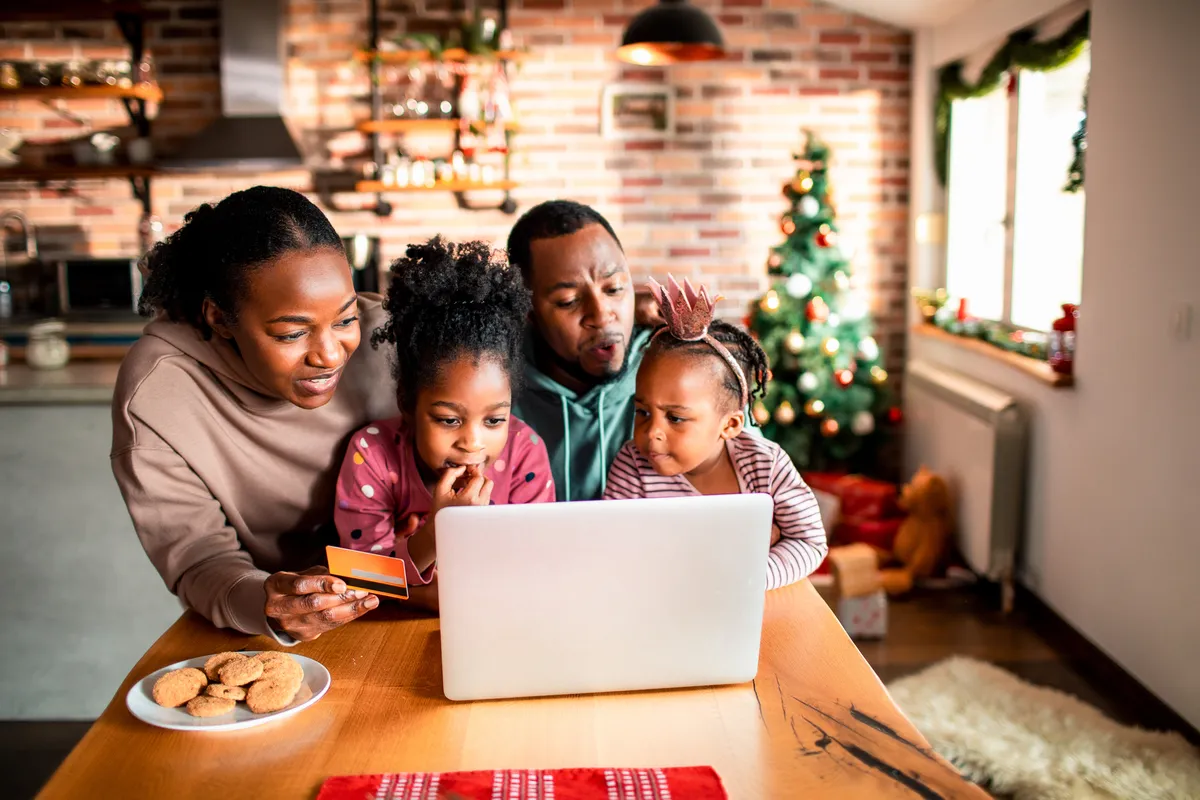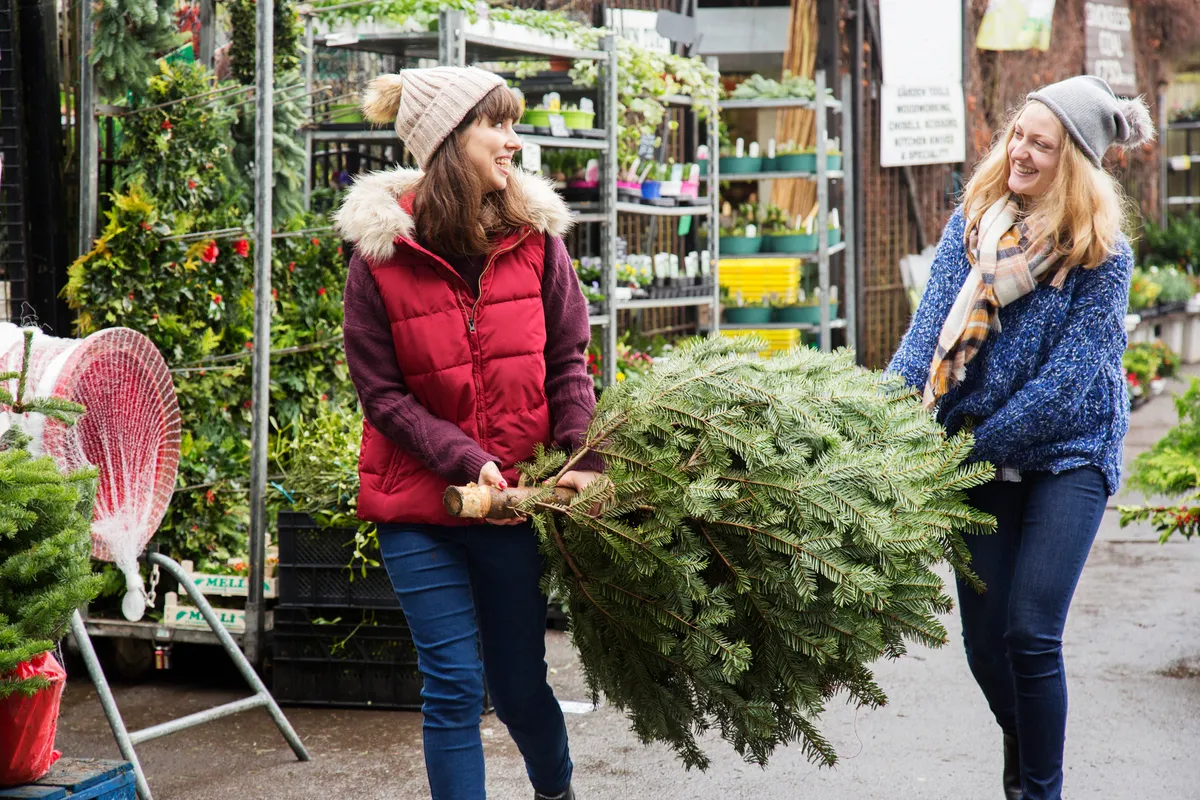What with all of the presents, packaging and overeating and drinking, the festive period is often a time of excess. So, if you’re dreaming of a green Christmas, here are some tips on making your celebrations more sustainable without having to go full Scrooge.
Avoid flying and take the train or bus where possible
Depending on how far you travel for Christmas, it may be that visiting your nearest and dearest is what causes your highest amount of emissions. A flight typically causes around six times the carbon pollution of a train, for example.
“If you fly, that's probably the biggest source of your climate pollution, so it is really important to reduce flights as much as possible,” says Kimberly Nicholas, associate professor of sustainability science at Lund University and author of Under the Sky We Make.
The question to ask, says Nicholas, is whether you can take fewer trips and stay longer.
“I think the hardest category to reduce are love miles,” she adds. “[But] finding ways to substitute flights as much as possible is a really high-impact climate action.”
One reader of her newsletter, for example, took the train across the US one way and then flew back, thus halving her flying pollution.
Minimising car use around Christmas can also have a big impact, says Mike Berners-Lee, a carbon footprint expert and professor at Lancaster University. In his book How Bad Are Bananas, he found excess travel was one of the most polluting things people do around Christmas.
“This is about people spending the day travelling all over the place to see tonnes and tonnes of relatives,” he says. “Actually, it just might be easier for everybody if it was on Zoom sometimes.”

Buy less food and make the most of leftovers
Each year, the UK throws away 4.5 million tonnes of food, worth an incredible £14 billion, and Christmas can be especially bad for food waste. Throwing away just one portion of Christmas dinner produces the same carbon emissions as having your Christmas lights on every day in December, according to sustainability charity WRAP.
"People buy more food to make and eat [at Christmas]," says Berners-Lee. "While the fantastic, celebratory meal is great, lots of food around Christmas just ends up not being eaten by anybody."
Often, even halving the amount of food cooked would still leave plenty for everybody, he adds. Also, be sure to use up any leftovers. If turkey sandwiches aren't your thing then freeze any extra bits and bobs to reheat at a later date.
Read more about climate solutions:
- Why carbon tax could be the answer to climate change
- Can rewidling save our climate?
- Overpopulation: can having fewer children help the environment?
Have a vegetarian, vegan or flexitarian Christmas
A vegetarian or vegan Christmas, or one with a lower meat consumption, is another high-impact change you could consider.
“We know that eating plants is better for the planet, and in general better for our health,” says Nicholas. “About no more than two burgers a month, two servings of fish, chicken and eggs per week, and one serving of dairy per day is the upper limit. I think people can figure out what works for them within that framework.”
If you're someone who eats animals, with holiday traditions that you want to focus those budgets on, it could be a good time to think about the quality of the food you buy, such as by sourcing local or well-raised animal products, she adds.
Switch to LED Christmas lights
An easy no-brainer at Christmas if you are still using incandescent fairy lights is to switch these to LEDs. According to Energy.gov they use up to 90per cent less energy and last up to 25 times longer than traditional incandescent bulbs, saving you money as well as carbon emissions.

Keep your tree for as many years as you can
What about that bastion of concern over Christmas excess, the tree? Berners-Lee says that you can relax about getting a natural tree. One good idea is to get a live tree, replant it in your garden after Christmas then bring it in every year, he says, while some companies offer rental schemes in the same vein. He advises generally steering away from plastic Christmas trees and other decorations.
“Try to make them as un-synthetic as possible,” he says. “And make sure if you do have [a plastic Christmas tree], that it gets used for many years on the trot, and that it's properly disposed of at the end of life.”
However, in the grand scheme of things it’s actually not that important what kind you get, says Nicholas.
“Get whatever you want as a Christmas tree and take one less flight or set up a recurring donation to a climate and environmental organisation. The Christmas tree is not a high-impact climate action, so I'm not that worried about it.”
Read more about the environment:
- Bizarre zombie fire outbreak rages on beneath the Arctic’s frozen surface
- Pioneering trial plants acres of seagrass meadows to revitalise England’s seabed habitat
- Coffee waste can supercharge the growth of new forests
Give gift receipts along with your presents
On average, UK households spend almost £740 more in December than in a typical month, a 29 per cent increase, according to a Bank of England estimate. Book sales double, sales of clothes increase by 49 per cent and purchases of alcoholic and other kinds of drinks increase by 38 per cent.
In Berners-Lee’s low-carbon scenario for Christmas, excessive spending on presents is replaced by more of a focus on festivity and community. Here, presents are thoughtful but not necessarily expensive, he says. “You encourage people to be honest in their reaction, and you've kept all the receipts.”
Opt for ‘experience’ gifts, or presents of service or time to your loved ones
Nicholas agrees that while gifts can be a sign of love, there can be too much focus on the consumption and materialistic part of it.
“I don't think that's really a win for anybody,” she says. “I really like the idea of giving gifts of time with the people you love.”
She suggests gifts of time or service are especially meaningful presents: such as starting a climate book club as a Christmas gift, or the example of fashion journalist Whitney Bauck who cleaned her sister's trainers for Christmas.
The Woodland Trust has some great ideas for outdoor Christmas activities for families, such as foraging for natural Christmas decorations or looking for festive winter wildlife.
“We've just got to go back to what Christmas is about: having a really nice day with people we love,” says Berners-Lee. “Going back to first principles can enable us to have a better time for less money and much better for the environment.”
